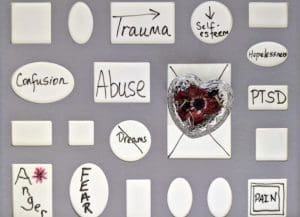Preface
For the purposes of brevity, I am not going to go over the mindset or the identity crisis within alienated children. If you are unsure what a child goes through during the abuse of parental alienation, I would suggest you come back to this article another time and do your own research first.
- For academic research, I would recommend reading the works of Dr. Craig Childress, Dr. Warshak, and Dr. Amy L Baker.
- For learning more on the perspective of formerly alienated children, I would recommend networking with Ginger Gentile, Dorcy Pruter, Ryan Thomas, or Crystal Shivers (AKA Kid of PAS)
- For those who have not seen the documentary Erasing Family, I would also suggest watching that film for free by clicking here.
Introduction
Every now and then I see this question crop up in Facebook groups in many forms.
“I wish more alienated children would speak out”
“I am so glad you are speaking out, but we need to hear it from a child’s perspective”
“Please talk to my child, maybe if they heard your perspective, they would understand what has happened to them.”
Now before I dive into any specifics, I am by no means an expert. I do not have a degree in psychology and I do not work with alienated children regularly. I am just a guy with an opinion.
That said, my opinion is based upon my own personal experience, both as a formerly alienated child, and as a former public speaker for the Parental Alienation movement. So, without further ado….
Why Alienated Children Do Not Speak Out?
While I wish I could break it down in a simple way, unfortunately the answer is multifaceted. What I can do for you is break this down into a few parts.
Alienated children avoid speaking out due to the impact of their abuse, the pressure that comes from being a public figure, and lack of incentive.
Impact of Abuse on Alienated Children
The nature of abuse involves a certain level of fear and submission to the power of the abuser. The victim typically believes they are unworthy of love and affection and thus, strive to “earn it” through appeasing the demands of their abuser. To prevent the victim from leaving, the abuser inculcates the mindset of helplessness into the victim while simultaneously building fear of the outside world. Abusers will rationalize their self-serving behaviors as “what is best for the victim”.
Once the victim reaches a breaking point, their fear of staying with the abuser must exceed their fear of leaving their abuser. Once this stage is reached, the victim takes a jump into the unknown and leaves behind their abuser. The story does not end here; in fact, it has only just begun.
Alienated children who break from the cycle of abuse find themselves in a similar conundrum seen in all abuse victims who leave their abusers. Oftentimes, people assume once you are free from an abuser that self-growth and healing begins naturally. Depending on their state of self-awareness, victims either undergo the arduous process of healing, fall into patterns of unconsciously continuing their abuse through abusive partners, or some combination of the two. How often do you find a friend or loved one who consistently finds a partner who may be charming at first, but soon shows their true colors as a narcissistic person?
Breaking the Cycle
There are a couple things to pay attention to when working with your friends who struggle with these recurrences.
Firstly, the individual must learn to value themselves enough to have unchanging personal boundaries. Abuse victims are taught early on by their abuser that they do not deserve boundaries. In fact, these victims are required to earn their boundaries through complete and total submission. How many times have you spoken to an individual who was so blatantly open about their past traumas? Consider for a moment, were these people speaking from a point of vulnerability or a point of pride? From my observations, abuse victims reserve their vulnerability to their abusers. Anyone can proudly list trauma after trauma to showcase a false display of strength or intimidate nosy people. Rarely, do these victims learn to share their true feelings and emotions with someone who will not use that vulnerability against them.
Secondly, the individual must find their own ground to stand on. Sounds simple enough. Most people learn this in their adolescence. However, in the absence of personal boundaries, comes the absence of personal values.
When every single day is a struggle to survive, loyalty is reserved for the provider.
Abusers use this to their advantage by requiring the victims to engage in anti-social behavior. This has multiple effects. The victim is first isolated from anyone unapproved by their abuser. This prevents the victim from seeking help, learning to build meaningful relationships with others, and most importantly prevent them from finding their role in the community.
As a result of these impacts, the abused victim must recognize first the deficits they have in terms of socialization and personal identity. This is where their fear of reintegrating in the world arrives from. If they have no place to belong, who would take them in? The abuse victim must go against this fear and try to relearn to be a social member of society. In this process, they have to undo habits ingrained in them that reflect their old subservient identity and embrace a new persona.
The victim must find their own strength, their own money, their own place to live. They must walk through the ugliest parts of their past and recognize that these are lessons to learn from. Only then, does the victim find their true identity. Otherwise the victim will continue to run from the pain. In doing so, they run into the same abusive loop again and again.
The Unseen Nature of Publicity
Being a public figure requires a high level of tact, communication skills, and a strong emotional foundation. As mentioned before, finding one’s own inner emotional strength is one of the hardest challenges posed to an abuse victim. The next step to become a public speaker requires something much more difficult, being vulnerable.
Vulnerability in Alienated Children
Vulnerability is a complex issue to tackle. Over the years, I have witnessed thousands of parents clam up after the betrayals from their fallen relationships and then refuse to take that chance again. Unfortunately, to their disappointment, these individuals will find all the comfort and joys of true intimate friendships and relationships to be behind the walls of coping mechanisms built from their own trauma. Many of them attempt to justify their behavior by displacing the blame on someone else. “There are no good men/women anymore” or “Nobody values a relationship anymore”. The irony is these parents then wish an alienated child would bring down their own walls and build a relationship with them.
Vulnerability between our loved ones is a difficult task. It requires us to wholeheartedly trust that the individual will respect our boundaries, autonomy and values. When someone fears vulnerability, they are expecting the other party to make judgement calls, insist on fruitless advice, and to misconstrue their experiences to the outside world. If we scale this up to being a public figure, you can infer the intensity of these fears. The worst part of being a public figure is that the judgement calls, the fruitless advice, and the misinterpreted experiences are far more emotionally taxing despite being a smaller percentage of the total supporters.
The Result of Not Setting Boundaries
To put this into perspective, an alienated child must first learn to break out of the abuse cycle and then build a public platform as a speaker. In this community, most parents rush immediately to the formerly alienated child with questions. After some time, the questions are very similar.
- What is your story? How did you figure it out?
- This is my entire life story, what do I do next?
- Can you do a favor for me? What is your contact information?
- Why don’t you act this way? You should listen to me because I know better.
MY MISTAKES
My biggest mistake when I entered the public arena was not learning to set boundaries for myself. At the time, I thought I was acting on integrity by bending over to invasive questions and attempting to pose as an advisor in roles I was not qualified for.
I have taken time away from holidays to counsel parents, when my mother whom I was estranged from, deserved my attention far more than anyone. There was a night where I stayed up late until 1am helping a parent work through emotional pain, while knowing I had to be at work at 6am. I have been requested to speak to alienated kids which in the few times I had done so, further estranged them from their parent.
When religion and politics are discussed, many parents will cease to support the alienated child on the account of brainwashing or difference of opinion. Some will make irrational commentaries suggesting the values held closely by the formerly alienated child are directly part of their trauma. Such comments are completely unwarranted and demonstrate a level of projection within the accuser. In my own experience, I strictly kept politics and religion away from my speaking platform at the expense of my identity. The result was having to constantly deflect questions regarding my personal beliefs.
Do You Have the Moxie?
Becoming a public figure requires a high level of tenacity. You are directly seeking out conflict by challenging the social norms that dictate society. As a public figure, you represent the collective feelings of your supporters. Many people are trained to avoid conflict rather than seek it. This feeling is exacerbated in the abuse victim. As the platform grows, you will find many people who will look for ways to attack your credibility and your character. Personal history is treated as a vehicle for slander. Typically, you can expect your supporters to protect your reputation and shun out the hecklers. In this fashion, a public figure continues to be safe as long as he/she maintains a specific set of values which are held dear to the masses. Make no mistake, this adoration from supporters can be dropped and reversed into ostracism overnight.
GAZE INTO THE ABYSS FOR TOO LONG AND THE ABYSS GAZES BACK
In my own experience, I came to the hard realization that I was becoming the embodiment of what I had escaped. My public message may have helped many. However, my content was built upon slanderous behaviors and actions. While people may argue such behavior is justified, I found far more empowerment within myself years later by focusing on building my own identity. Many people took advantage of the pro bono work I was doing. At the same time, no one recognized the anger I carried underneath it all. As a result, I burned myself out, ultimately receding from the public eye.
Now in no way am I stating that public figures should be free from this level of scrutiny. Rather my goal in this description, is to make clear what the role entails. Through my own experience, I found myself burnt out due to my own lack of personal development. In retrospect, going public did help me find my own inner truths, but as I have mentioned before the process of healing is painful. If you have not stepped into the public eye, consider for a moment your own reasons for not doing so. It is likely that many alienated children have similar reasons not to.
Lack of Incentive For Alienated Children
Upon reaching adulthood, our personal responsibilities define our daily routines. The people who have the benefit of learning and following the frameworks of previously successful people will quickly find a path that suits their financial, social, and familial needs. Make no mistake, this takes a great deal of time and a keen sense of observation. The effort required to build a successful life certainly does not come easy to most people. The majority of us find ourselves working 40 – 60 hours a week to earn enough just to pay our bills. The remainder of free time is devoted to family, friends, and recreation.
Without diving into the politics of the matter, true success in public platforms requires a full-time commitment. If you go behind the scenes, you will find a 10 minute long YouTube video may take up 4 – 6 hours of time to create it. This blog I have written has taken me almost 10 hours to conceptualize, write, edit, and proofread. I did not learn to write well overnight. At a certain point, the content creator must make a value judgement.
What are the incentives? How will the bills be paid at the end of the day?
“I Want You To Give Me Your Time and Effort for Free”
You may have seen formerly alienated children are beginning to create and sell reunification courses for parents. This has sparked some debate and even led some parents to engage in slanderous behavior. On one hand, many parents have been bled dry due to alimony, child support, and the cost of their legal fees. Some of these parents feel that their financial lack is yet another barrier to reunification. As a result, they project that frustration and anger onto the course creator. I have seen demands for all this content to be released free to the public so that anyone can benefit. Their justification is an appeal to morals. If the online course was free, only then will these people accept the course creator as an individual of compassion, integrity, and authority. Otherwise, these people complain that the course creator is selfish, a charlatan, and greedy. The irony is too blatant.
The most intimidating gatekeeper to having alienated children as public speakers is the supporters themselves. You will find even the most active advocates in the parental alienation community are degraded and slandered daily. Their aggressors have absolutely no idea, how much time and effort these advocates have put in for other people. They too have to set boundaries. These advocates have their own struggles. Like you, they too have to pay their bills and feed themselves. To ask anything more of these advocates is to be manipulative and selfish.
Action Items
I have learned that by transforming our internal world, we are able to ripple change in the external world.
Before wishing for more alienated children to speak out, begin first by examining the environment they are walking into. These young men and women have lived significant portions of their lives without a loving maternal and/or paternal influence. Their boundaries are minimal. They believe they are able to think for themselves, yet act on defense mechanisms set in place by their abuser. In order to really help these young men and women, first they need to find their true sense of self. That is a solo journey they must embark on. What you as an individual can do for them, is simply be a lighthouse in a storm. Show them the dangers, but let them find their way to safety.
I would personally recommend undergoing your own journey of personal growth as well. Take a moment to really think about what makes you happy and what makes you unhappy. Identify the behaviors that are hurting you and make changes to live a life on your terms. Live actively, not reactively.
Lead by example and others will follow.
Until next time,
Andrew




